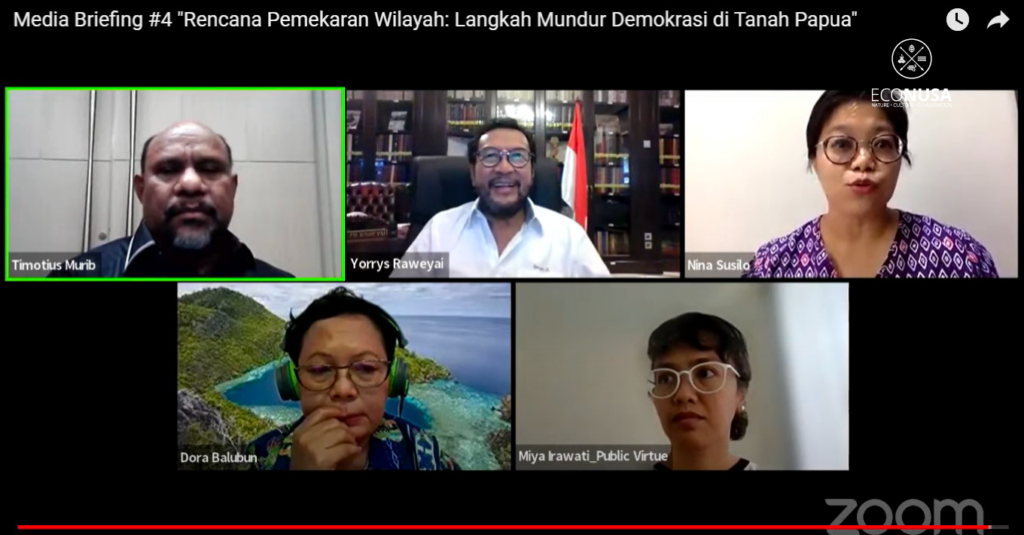
The House of Representatives passed three draft bills on new autonomous regions in Papua to become the House’s initiative bills through plenary session on Tuesday, April 12, 2022. If the bill is passed, it will become the legal foundation of the creation of three new region expansions, namely South Papua, Central Papua, and Papua Central Highland. However, these regional expansion plans are considered to be full of problems, one of which is the lack of communications with the Papuan natives (OAP).
“Without coordination with locally-based state institutions andwithout Papuan native participation, the expansion is the Jakarta design,” said Chairman of Papuan People’s Assembly (MRP), Timotius Murib, in a webinar held by Public Virtue Institute on April 14, 2022.
The draft bill on regional expansion which was made without involvement of MRP is questionable. The problem is, Law Number 2 of 2021 about Second Amendment to the Law Number 21 of 2001 about Special Autonomy for Papua Province, which becomes the legal basis of regional expansion draft bill, mentioned that regional expansions can be done with approval from MRP and Papuan People’s Representative Council (DPRP). Therefore, MRP strictly refused the regional expansion plans in Papua.
Read also: Blue Ecomic Implementation Not Optimum
Timotius considered the problems of regional expansion plans in Papua are closely related to the problems in the Papua Special Autonomy Law. The Law Number 21/2001 mentioned that the law amendment can be done with approval of MRP and DPRP to the Lawmakers or Government. However, after 20 years, the Law Number 2/2021 which was unilaterally made by the Central Government was published as a substitute, without MRP involvement.
According to Timotius, the mechanism that runs improperly has harmed the OAP constitutional rights. This gives MRP the reason to propose a judicial review against the Law Number 2/2021 to the Constitutional Court (MK). Until now, the judicial review process is still ongoing.
Amnesty International for Indonesia Executive Director, Usman Hamid, said that the regional expansion draft bill was the decline of democracy. Some indicators of the decline are marked by the weakening local governments, minimal access for media cover, high repression level, and also noncompliance with the law.
“Regional expansions based on the new 2021 Special Autonomy Law, which was made without any consultation with Papuan People’s Assembly, without consultation to Papuan People’s Representative Council, and also Papua Governor, reflect the noncompliance with the law that have been previously agreed,” Usman said.
Read also: Sasi Sambite: Local Wisdom to Boost Nutmeg Quality in Arguni Bawah
Usman explained that Amnesty International reported the repression level in the region of expansion is still high. Especially in Intan Jaya, extrajudicial killings, evacuation, and other human rights violations still happen. This condition is strengthened by the rising military presence as from 2 posts in 2019 to 17 posts in 2021.
Reverend Dora Balubun also regretted the regional expansion plan. According to her, most human rights violations happen in the regions of expansion. One of the examples occured in Maybrat, West Papua. Thousands of Maybrat civilians have become refugees since September 2021 until March 2022 because of conflict between security forces and West Papua National Liberation Army (TPNPM), but still with minimal approach from the government.
“They are civilians who become refugees and do not get any attention. How can the expansion happen in the middle of inequality of justice, inequality of welfare, inequality of education, inequality of many problems faced by Papuan people these days? So, my question is this expansion a gift? Or, is it a disaster sent to Papua peoples?” Dora said.
Read also: Human Resource Quality, Key to Win West Papua Tourism
Dora said that the regional expansion will potentially cause a new conflict. The problem is the OAP is too small in number and very left behind to conduct regional expansion. The worries arise if the region of expansion will not be populated by OAP but by the military apparatus.
In response, the Regional Representative Council (DPD) member from Papua, Yorrys Raweyai, explained the reason behind the expansion scheme. According to him, regional expansion in Papua is not seen from the demographic but rather geographical viewpoints. This is a strategic plan by the Central Government.
Yorrys explained the achievements of DPD such as initiating Papua Special Committee that has organized 6 meetings with MRP and Local Government. Because the policy has been made, Yorrys called the Local Government to promptly draft Provincial Bylaws (Perdasi) and Special Bylaws (Perdasus) as the implementation of Special Autonomy II.
Read also: License Revocation Hearsay, A Spirit Booster
“We can’t focus too much on judicial review at MK now, but the most important thing is the discussions about Perdasi and Perdasus because in July they (must) be done,” Yorrys said.
Responding to public rejection, Yorrys argued that the regional expansion had ever been submitted to the former regime of President Susilo Bambang Yudhoyono. Even the President’s mandate has been issued. But, the budget was not sufficient to conduct expansion at that time.
Editor: Nur Alfiyah, Leo Wahyudi, Lutfy Putra









